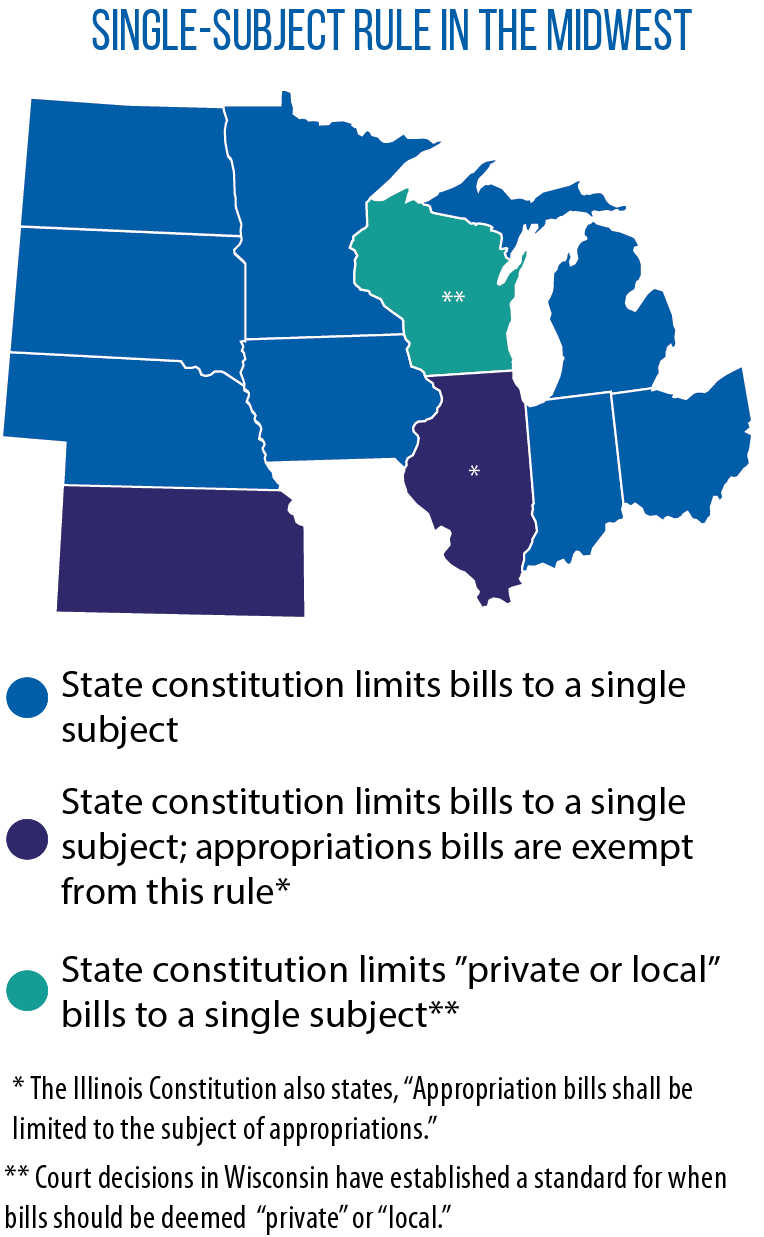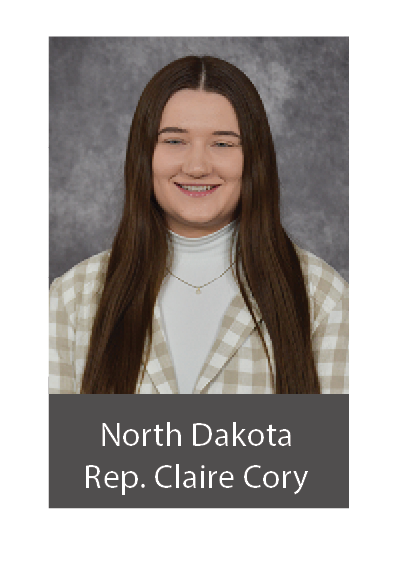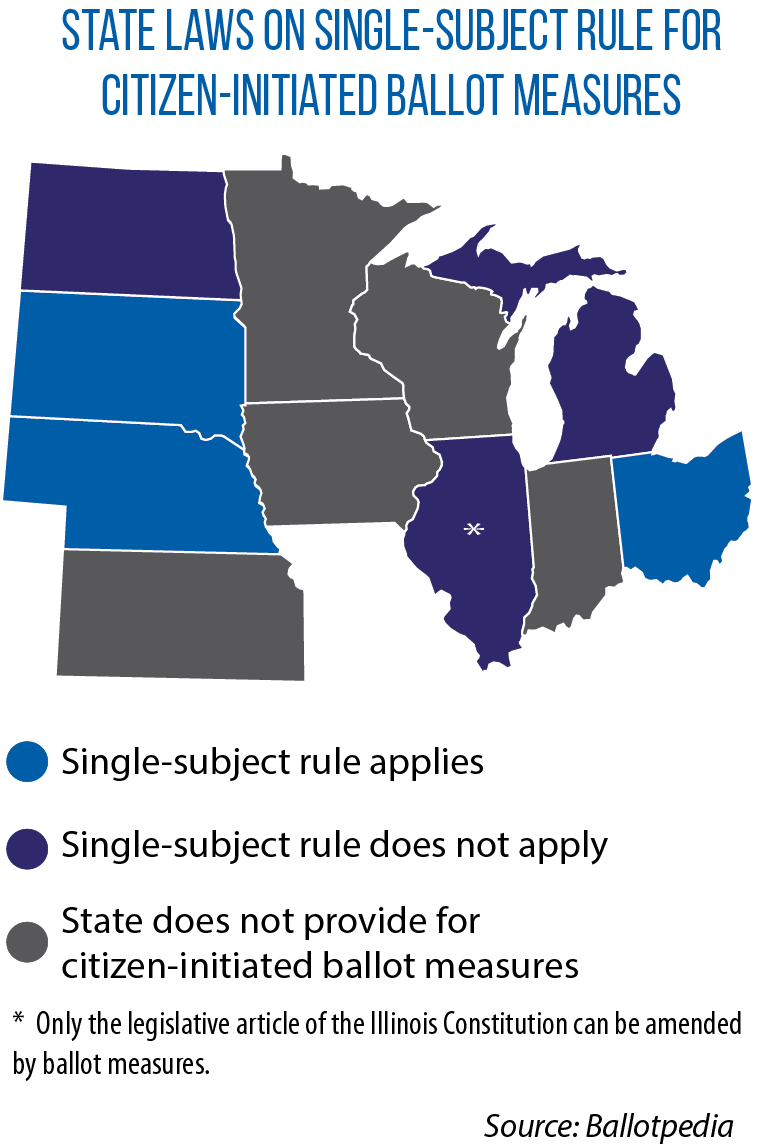The language in state constitutions is sometimes as old as the documents themselves: No bill or law shall “embrace” or “contain” more than a single subject.
 Every state in the Midwest, and 43 of the 50 U.S. states, has some version of this single-subject rule, a constitutional provision adopted by states to prevent legislative mischief and “logrolling” and to control the powers of special interests, says David Schultz, a political science professor at Hamline University who also teaches law at the University of Minnesota.
Every state in the Midwest, and 43 of the 50 U.S. states, has some version of this single-subject rule, a constitutional provision adopted by states to prevent legislative mischief and “logrolling” and to control the powers of special interests, says David Schultz, a political science professor at Hamline University who also teaches law at the University of Minnesota.
“It remains relevant as a provision that can be used to maintain transparency and accountability,” he says.
But is it being used?
That depends on the state. In Minnesota, Schultz says, the single-subject rule has been “de facto dead” for a quarter-century. However, two closely watched cases in the Midwest in 2023 were based on claims that state legislatures had violated the single-subject rule — one, a challenge to a new law on abortion and gender-affirming care in Nebraska; and the second, a Supreme Court ruling in North Dakota that struck down an omnibus bill (mostly) on state government operations and spending.
Nebraska’s ‘Christmas tree’ session, single-subject case
The lawsuit in Nebraska was filed near the end of an unusual 2023 session in that state. First, there was an extended filibuster from opponents of proposals to outlaw most abortions after 12 weeks of pregnancy and to ban gender-transition surgeries for individuals 18 and under. The response to this filibuster, and its delaying of action on other measures, was for legislators to adopt a “Christmas tree” approach: package provisions from different bills into larger, omnibus bills.
Nebraska’s LB 574 was amended during session to pair the prohibitions on abortion and transgender care (they originally were separate bills); after being signed into law, this measure was challenged over this constitutional language in Nebraska:
“No bill shall contain more than one subject.”
In August, a state District Court upheld the Legislature’s actions, saying the two provisions in LB 574 “relate to health care.” The court also noted that Nebraska’s judicial branch has historically been “circumspect about acting as a super-parliamentarian.” On the single-subject rule, this has meant that so long as a bill’s provisions fall under some “general object” (health care, in this instance), the measure gets upheld.
Court decision in North Dakota necessitates special session
Near the end of their 2023 regular session, North Dakota legislators passed SB 2015, which funded certain operations in state government but also changed composition of the North Dakota Public Employees’ Retirement System Board of Trustees. The number of members was changed from nine to 11, and the number of legislators on it was increased from two to four.
 The board challenged this legislative action on several grounds, including violation of North Dakota’s single-subject rule:
The board challenged this legislative action on several grounds, including violation of North Dakota’s single-subject rule:
“No bill may embrace more than one subject, which must be expressed in its title.”
In fall 2023, the North Dakota Supreme Court ruled that SB 2015 violated this rule by embracing “multiple distinct subjects extraneous and not germane to even the impermissibly broad topic of state government operations” — grants for public broadcasting, fertilizer-development incentives, penalties for drug trafficking that lead to injury or death, etc.
The justices noted, too, that the legislature had earlier in the session voted down a stand-alone measure seeking a change in composition of the retirement board.
The court’s decision struck down SB 2015 in its entirety. To avoid a shutdown of the government services funded in the bill, legislators came back to Bismarck for an October special session, during which they approved 14 separate measures, including one changing composition of the retirement board.
 North Dakota Rep. Claire Cory says the court’s decision caught her and other lawmakers by surprise because seemingly similar Office of Management and Budget bills had been passed in previous sessions.
North Dakota Rep. Claire Cory says the court’s decision caught her and other lawmakers by surprise because seemingly similar Office of Management and Budget bills had been passed in previous sessions.
“My first session [in office], it was fine; in other sessions, it was fine,” she notes. “This time, it was not.”
The difference was that this year’s measure prompted a legal challenge, namely because of the changes to the retirement board.
‘Good idea in principle … Hard to operationalize’
According to Columbia Law School professor Richard Briffault, courts, on balance, have shown deference to legislatures and often rejected lawsuits based on the single-subject rule. However, there have been notable exceptions, including decisions in recent decades that invalidated state laws on guns, abortion, tort reform and immigration.
“The ultimate problem is the lack of definition of ‘single subject,’ “Briffault says. “Courts can read that word ‘subject’ broadly or they can read it narrowly. There is no real guidance on this, and it’s not clear to me how there really could be.
“Where that leaves us is a good idea in principle, but one that is so hard to operationalize, and may turn out to backfire in practice.”
One potential problem, he adds, is that it leaves open the possibility of “outcome-driven decisions” by judges — overturn a legislative action they don’t like by applying a narrow interpretation of “single subject,” or uphold a law by taking a broader view.
Second, the functioning of legislatures may suffer under a narrowly interpreted single-subject rule.
“As we see with the increasing difficulties of Congress getting anything done, we want to make sure there is some room for compromise,” Briffault says. “Part of that may involve stapling unrelated things together to get a majority to get things through. It may be the way deals have to get done.”
‘Not fair to voters’
Though every state in the Midwest has “single subject” constitutional language, it doesn’t necessarily apply to citizen-initiated ballot measures (see map).
 Cory says this can create a dilemma for voters when they are asked to decide the fate of one proposal with multiple, unrelated provisions in it. The North Dakota legislator points to a proposed constitutional amendment from 2020 in her home state as a case in point. It called for North Dakota to adopt ranked-choice voting as well as an independent redistricting commission. Also in that same measure was language to improve the overseas voting process for members of the military.
Cory says this can create a dilemma for voters when they are asked to decide the fate of one proposal with multiple, unrelated provisions in it. The North Dakota legislator points to a proposed constitutional amendment from 2020 in her home state as a case in point. It called for North Dakota to adopt ranked-choice voting as well as an independent redistricting commission. Also in that same measure was language to improve the overseas voting process for members of the military.
The amendment never made it to state ballots (it was blocked by the courts for a reason other than single subject), but Cory believes it’s an example of the potential problem of having distinct policy changes being included in a single ballot initiative: A person may have supported more help for overseas voters, for example, but not wanted ranked-choice voting.
“We’ve seen ballot initiatives with multiple subjects that would change the [North Dakota] Constitution in several ways, but then supporters campaign on just one aspect of it,” Cory says. “That’s not fair to voters.”
This year, she served as one of the co-sponsors of a measure that would, in part, apply the single-subject rule to citizen-initiated ballot measures in North Dakota. SCR 4013 will go before voters in November 2024.
In states where the single-subject rule does apply to both legislative actions and citizen-initiated measures, one question for the courts is whether the same standard should apply. Three years ago, a proposal to legalize medical cannabis in Nebraska was kept off ballots by the state Supreme Court on the grounds that it violated the single-subject rule by including sections on cultivation, use, possession, health insurance and more.
Judges in that state have said that a stricter single-subject standard should be applied to citizen-initiated ballot measures than to bills coming out of the Unicameral Legislature.
Columbia Law School Professor Richard Briffault says it makes sense to have such a varying standard.
“The case [for single subject] is stronger with ballot propositions, and that’s because ballot propositions aren’t amendable by the voters, whereas with legislatures, provisions always can be taken out.”
Capital Closeup is an ongoing series of articles from CSG Midwest that focus on institutional issues in state governments and legislatures.
The post Capital Closeup: In the Midwest, every state constitution has a ‘single subject’ rule, which was at the center of two recent cases in Nebraska and North Dakota appeared first on CSG Midwest.




